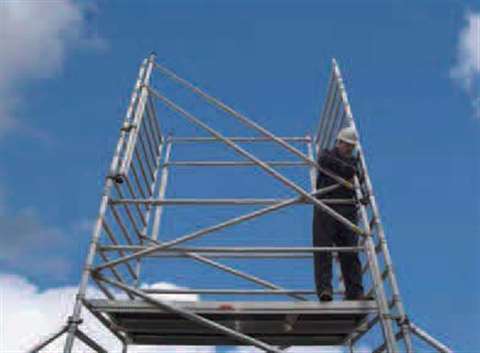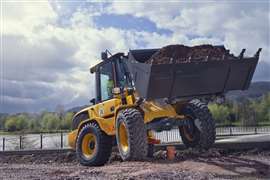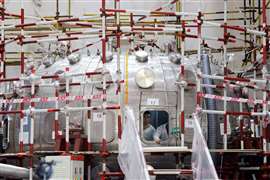Safe Towers
01 May 2008

Mobile access towers have been, since their introduction, very safe, effective and efficient work at height equipment. They remain so today. In common with much other equipment, in its completed form it is as safe a place for working at height as any other-up amongst the best in the hierarchy, immediately after avoiding work at height altogether, if possible.
But, like other work at height equipment, it is only in these past few years that we have turned our attention to how we can eliminate, or at least minimise, the risk of falling during assembly, dismantling and alteration processes.
It is not that we have been insensitive to, or unconcerned about, the potential risks of falling for those who assemble, dismantle or alter tower scaffolds-if the truth be known, we kind of had not thought about it. You see, our thinking had always been, “Of course we know that guardrails should be installed-the law requires it, and we don't want people being injured or killed because they've fallen from one of our towers. And when this tower is finished and complete, it will have all of those good things! But how can the guardrails be there until I've put them there?”
It is only when you do think about it and when, if we're being honest, that we get back to the basics of what we have actually asked people to do to assemble towers, that there comes the gradual realisation, “Hey, that's actually quite dangerous-somebody could fall and get hurt.”
There must be a better way
As soon as you shift from “that's how we've always done it” to “there must be a better way”, you know you're heading in the right direction and that solutions are there to be discovered.
There were a number of possible solutions, some of which were discounted because, in the final analysis, we were convinced that they were too method dependant, that is, they depended too much on the operative remembering a fairly complex set of positioning and repositioning instructions.
So, we have settled on two currently recommended and approved assembly, dismantling and alteration methods, in consultation with the UK's Health & Safety Executive (HSE). They are the Advance Guardrail method and the Through The Trap, or 3T, method.
The Advance Guardrail method relies on an additional set of equipment in assembly, dismantling and alteration processes. Guardrails are positioned from the level below before the platform itself is placed. Thus, the completed platform has collective fall prevention measures in place before the operative gains access to it.
The 3T method allows the operative to position himself through the trap of the platform and place horizontal braces ahead of himself so that collective fall prevention measures are in place before he stands on the platform.
Using both of these methods, we are now able to make a simple, but definitive statement: “You should never have to stand on an unprotected platform”.
You may have noticed the term I used in describing the PASMA approved and recommended methods, namely these are the currently approved methods.
One of the underlying principles of the new Working at Height Regulations (WAHR) in the UK is that it should not be technology dependent. That is, we should not preclude future inventions or new methods which are as good, or better than the currently recommended methods. This is a principle that PASMA wholeheartedly endorses.
A third approach
In PASMA we have come to the conclusion that the implementation of the WAHR not only requires the joined up thinking that has been the very basis of this entire process, but that it also requires a three-dimensional approach.
PASMA has now agreed upon just two currently recommended methods, but we now want to ensure that we have a robust system of ensuring that these methods are delivered, and delivered consistently.
PASMA has commissioned a review and complete overhaul of instructor training modules and will soon announce the opening of the PASMA National Instructors' College. It will be the Centre of Excellence in producing fully knowledgeable and equipped Instructors trained and qualified to nationally accredited standards in four key skill areas:
1 Instructional techniques
2 Health & safety
3 Industry specific techniques
4 PASMA training scheme procedures
PASMA will also soon announce the allocation of a sizeable sum of money to train and assess all our current Instructors at our national college to ensure they are all completely up to speed with WAHR and the currently approved methods.
This three-dimensional approach also applies to a wider communication and education strategy. We have just completed, with the assistance and co-operation of the SHE Policy Unit, a DVD, “Don't Fall for It”, giving guidance on preventing falls during assembly, dismantling and alteration of mobile access towers. This DVD will be available free of charge.
We will soon announce details of our PASMA Road Show that will take our “Methods Measure Up” campaign around the UK, to communicate the message of WAHR and the current, approved assembly methods. These are aimed at our own members' staff, construction main and sub-contractors, health and safety professionals from all industries, and local authorities.
At our AGM in March, we announced the appointment of PASMA Ambassadors, industry experts who will attend and give a presentation to User Groups, Health & Safety Groups and indeed any other group that expresses an interest in safe work at height with mobile access towers. Their presentation is entirely non-commercial and their services are offered completely free of charge. PASMA meets all their expenses.
I touched earlier on the important role that rental companies have in the supply chain. We are working closely with bodies such as Hire Association Europe to highlight the issues and roll out the key messages to their members. Our next planned initiative in this respect will be, with the assistance and cooperation of the HAE, to make contact with the non-member rental companies in their extensive database to get the same message across.
Finally, we have been active in our press relations to flag the changes proposed and their implication for users. This press activity will continue throughout the remainder of the year.
Other impacts of WAHR
One of the impacts of anticipation of the WAHR has been the increasing use of Low Level Access tower equipment, particularly by finishing trades. Podium steps, or pulpit steps, folding room scaffolds and wide platform towers are increasingly being selected in preference to more conventional work at height equipment, especially where the work is more prolonged.
PASMA has developed a Low Level Access course that will be piloted in June and July. In co-operation with our colleagues in the Electrical Contractors Association, we will also be promoting a jointly sponsored and branded “Working at Height and Low Level Access” training course. We will work with other user organisations on similar joint initiatives.
We have a considerable task ahead. The approved methods represent a substantial shift from the conventional. We know that it is not enough for PASMA to come up with the solutions. We need to have a concerted effort to win hearts and minds to change the habits of a lifetime. Instruction manuals and approved methods do not change attitudes. People change attitudes.
So, the message from PASMA is: “You should never have to stand on an unprotected platform”.
Statistics, damned statistics
Which leads me rather nicely to a little difficulty that we have encountered in this respect. The statistics in this area are somewhat hazy-not enough questions are asked to allow us, or any of our sister organisations in the Access Industry Forum, to be able to determine with any accuracy whether anything we do to improve safety makes a difference. I take this opportunity to articulate our firm belief and desire that the current consultation process in the UK for RIDDOR [regarding the reporting of accidents at work] will result in more effective gathering of information, which will allow us, and indeed the HSE, to measure the effectiveness of the WAHR and the many initiatives in support of its aims.






